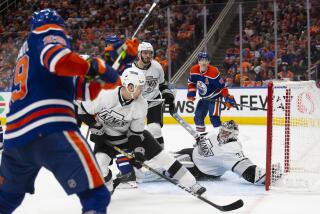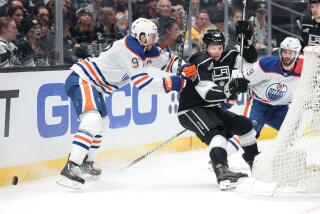Success Starts With a Hot Goalie
DETROIT — Some wise man, perhaps the one who described the central idea of hockey as putting the biscuit in the basket, once said hockey should be called “goalie” because good goaltending is the prerequisite for success.
The Kings, who begin their first-round Stanley Cup playoff series against the Detroit Red Wings Wednesday at Joe Louis Arena, would undoubtedly agree.
Without Felix Potvin, who was 13-5-5 with a 1.96 goals-against average and a .919 save percentage since he was acquired from Vancouver Feb. 15, the Kings wouldn’t be formulating playoff strategy. He played the last 23 games of the season, maintaining a steady, sure rhythm that gave teammates the confidence to take an occasional chance without fearing a mistake would cost them a game.
“Felix continued to play because he continued to play well,” Coach Andy Murray said. “If I had taken Felix out during that streak, it would have been sending the wrong message about whether we were doing everything to win each individual game.”
Barring an injury or collapse, Potvin will play every playoff game too. He has carried that burden before.
In 1993, then 21 and with 52 games’ NHL experience, Potvin led the Toronto Maple Leafs to the conference finals, where they lost to the Kings in seven games. He played 21 games, winning 11 and losing 10 and playing 1,308 minutes.
He carried the Leafs to the conference finals again in 1993-94, when he was 18-9-9. For his career, he’s 25-27 in the playoffs with five shutouts and a 2.75 goals-against average.
His playoff exploits became another chapter in the lore of goalies’ postseason heroics.
Of the 36 times the Conn Smythe trophy has been awarded to the most valuable player in the playoffs, it has gone to a goalie 11 times. And of the Conn Smythe winners who played for the losing team in the finals, three were goalies. The first was Detroit’s Roger Crozier, whose team lost the 1966 finals to the Montreal Canadiens. Glenn Hall of St. Louis won in 1968, after the Blues were swept by Montreal in the finals, and Ron Hextall of the Philadelphia Flyers won in 1987, although his team lost to the Edmonton Oilers.
The youngest player to win the Conn Smythe was a goalie--20-year-old Patrick Roy, then of Montreal, in 1986. He had merely 48 games’ NHL experience, but he wasn’t the first goalie to establish himself as a clutch performer in the playoffs before he got extensive regular-season experience.
That distinction belongs to Ken Dryden, a Cornell graduate who played in six NHL games before he inherited the Canadiens’ starting job in the 1971 playoffs. He led them to the Cup and the next season, won the Calder trophy as rookie of the year.
Besides having been a marvelous goalie, Dryden is a skillful writer, as evidenced by his analysis of goaltending in his perceptive book, “The Game”:
“If you were to ask a coach or a player what he would most like to see in a goalie, he would, after some rambling out-loud thoughts, probably settle on something like: consistency, dependability, and the ability to make the big save. Only in the latter, and then only in part, is the physical element present. Instead, what those qualities suggest is a certain character of mind, a mind that need not be nimble or dexterous, for the demands of the job are not complex, but a mind emotionally disciplined, one able to be focused and directed, a mind under control.
“Because the demands on a goalie are mostly mental, it means that for a goalie the biggest enemy is himself. Not a puck, not an opponent, not a quirk of size or style. Him. The stress and anxiety he feels when he plays, the fear of failing, the fear of being embarrassed, the fear of being physically hurt, all are symptoms of his position in constant ebb and flow, but never disappearing. The successful goalie understands these neuroses, accepts them, and puts them under control. The unsuccessful goalie is distracted by them, his mind in knots, his body quickly following.”
Like Dryden, Hextall was a tall, gangly goalie who had a phenomenal first playoff. Combative, an excellent puck handler and prone to loudly whacking his goal posts to orient himself, Hextall used his 1987 playoff performance as the springboard to a fine career. Roy, who talked to his goal posts and had a wide feisty streak, has his name on the Cup three times, twice with Montreal and once with Colorado, and he became the NHL leader in victories this season.
But for every Dryden or Roy who proves himself year after year, there are goalies who have one brilliant series or one singular spring, then disappear.
Among the Canadiens’ all-time playoff shutout leaders are Dryden, Jacques Plante, George Hainsworth, Roy--an estimable group--and Steve Penney, who had a couple of magical playoff series in the mid-1980s before fading into obscurity. More recently, Brian Boucher had a superb first year with the Flyers last season and reached the Eastern Conference finals, but his goals-against average ballooned this season and he lost his job to Roman Cechmanek.
Murray saw what a hot goalie can do in 1991, when he was an assistant coach of the Minnesota North Stars. Like the Kings this season, the North Stars came together late, then made it to the finals before losing to the Penguins.
“Jon Casey had had a real up-and-down year, and he was unbelievable until the last two games against Pittsburgh,” Murray said. “The situations are somewhat similar. The last 20 games, we were one of the top teams in the league. Jon got hot and we beat Chicago, St. Louis and Edmonton. We were up, 2-1, in the finals, until Mario [Lemieux] decided he wanted to win the Stanley Cup.”
Potvin has withstood playoff-like pressure since he arrived. He hasn’t had to be spectacular every game, but his calmness and occasional game-stealing saves made the Kings’ playoff push possible--and that could be just the start.
“With the goaltending we’re getting,” teammate Luc Robitaille said, “we could surprise a lot of people in the playoffs.”
Notes
Defenseman Lubomir Visnovsky is questionable for Wednesday’s game because of a bruised left leg. Visnovsky, injured in the season finale Saturday at Calgary, tried to skate Monday at HealthSouth training center but left the ice quickly. Centers Bryan Smolinski (back spasms) and Ian Laperriere (concussion) practiced Monday and are expected to play Wednesday. Defenseman Aaron Miller (sprained wrist) didn’t skate with the team and is doubtful for the opener.
More to Read
Go beyond the scoreboard
Get the latest on L.A.'s teams in the daily Sports Report newsletter.
You may occasionally receive promotional content from the Los Angeles Times.







